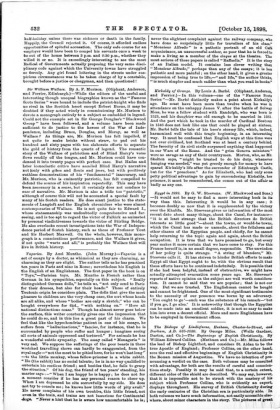Sir William Wallace. By A. F. Munson. (Oliphant, Anderson, and
Ferrier, Edinburgh.)—While the editors of the useful and interesting though unequal biographies known as the "Famous Scots Series" were bound to include the patriot-knight who finds no rival in the Scottish heart except Robert Burns, it may be doubted if they acted wisely in commissioning Mr. Munson to devote a monograph entirely to a subject so embedded in legend. Could not the example set in Sir George Douglas's "Blackwood Group" have been followed, and a volume have been made sufficient to do justice to the heroes of the War of Inde- pendence, including Bruce, Douglas, and Moray, as well as Wallace ? As things are, Mr. Munson has felt impelled, if not quite to make bricks without straw, to pad out his hundred and sixty pages with too elaborate efforts to separate the gold of history from the quartz of legend. The romantic story of the Wallace of patriotism and of Blind Harry's verse flows readily off the tongue, and Mr. Munson could have con- densed it into twenty pages with perfect ease. But Hailes and later iconoclastic critics have assailed Blind Harry's narrative riot only with gibes and flouts and jeers, but with positively ruthless demonstrations of his " fundamental " inaccuracy, and Mr. Munson, who is eminently patriotic, has felt compelled to defend the source of his inspiration repeatedly. This may have been necessary in a sense, but it certainly does not conduce to ease of narrative. Mr. Munson is also a trifle too "patriotic," although of course this will not be accounted a special fault by many of his Scotch readers. He does scant justice to the state- ments of Langtoft and the English chroniclers who were almost contemporaries of Wallace. He is not quite fair to Edward I., whose statesmanship was undoubtedly comprehensive and far- seeing, and is too apt to regard the victor of Falkirk as animated by personal vindictiveness towards the victor of Stirling Bridge. He also overlooks recent investigations into the War of Indepen- dence period of Scotch history, such as those of Professor Tout and Sir Herbert Maxwell. On the whole, however, this mono- graph is a conscientious performance, and the Wallace it gives, if not quite "warts and all," is probably the Wallace that will live in British history.






































 Previous page
Previous page